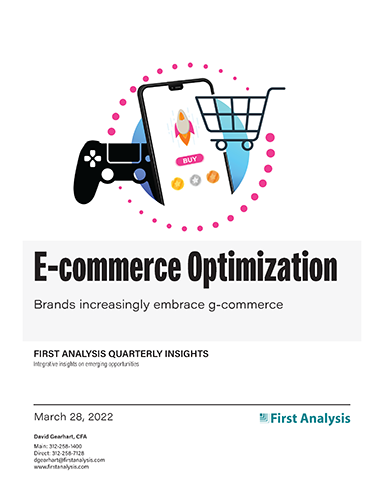Quarterly insights: E-commerce optimization
Brands increasingly embrace g-commerce

Consumer brands and mobile game companies increasingly appreciate the potential to sell real-world goods inside online games. The enormous and diverse nature of the mobile game player user base combined with the large amount of time players spend in games makes online games an outstanding channel for engaging with consumers and generating addi-tional revenue for both brands and game companies.
True g-commerce is built around the understanding that players are in the gaming environment to play games, not shop. To that end, g-commerce interactions and transactions happen entirely within games, and g-commerce technologies focus on presenting ads and enabling in-game purchases in ways that are both highly effective and minimally dis-ruptive; indeed, successful g-commerce is often designed to enhance gameplay and reinforce positive brand associations.
We believe g-commerce is gaining momentum and see an increasing number of brands set to launch dedicated initiatives. We expect most brands to use third-party g-commerce technology solutions, driving strong demand and revenue for solution providers, who collect advertising fees and revenue shares on brand product sales.
We highlight key g-commerce-related functions we expect to be broadly adopted and profile some of the companies providing these capabilities.
TABLE OF CONTENTS
Includes discussion of seven private companies
- What is g-commerce?
- A note on the metaverse
- Audience dynamics make mobile gaming a strategic commerce channel
- Key g-commerce functions
- Compelling reasons for increasing g-commerce adoption
- Multiyear tailwind for g-commerce tech vendors
- A win-win game
- First Analysis E-commerce Optimization Index shows slight recovery from recent nadir
- E-commerce optimization M&A sustains strong pace
- Q1 e-commerce optimization private placements approach Q4’s two-year high
What is g-commerce?
G-commerce, short for gaming e-commerce, means promoting and selling products inside digital games played on connected devices, such as smartphones, tablets and personal computers, which are typically used for internet search and online shopping. Brands and game companies recognize the overlap and increasingly appreciate the potential to sell real-world goods directly to consumers within games, as digital game players have long seen advertisements in games and are accustomed to purchasing game-related items in them, such as tokens and virtual goods. For brands, games can be a strategic channel for engaging customers, selling goods and increasing customer loyalty. Game companies can further monetize their player networks by integrating the g-commerce technologies that enable this channel.
It is important to emphasize that g-commerce differs from general e-commerce in that g-commerce transactions happen entirely within the game. In-game advertising links that take players outside the game to a web storefront, for example, are not g-commerce. True g-commerce is built around the understanding that players are in the gaming environment to play games, not shop. G-commerce technologies thus focus on keeping players in the game environment and mini-mizing disruption to players and games. This means promoting products only at natural break points in games, such as in game lobbies or between levels, or in gameplay, such as by showing advertisements as part of the background or game objective and by offering streamlined purchase screens that make it quick and easy to select and pay for products and then return to gameplay. In successful g-commerce interactions, players remain immersed in games, see highly targeted ads from curated brands, purchase products and develop positive associations between brands and fun gameplay.

Request full report
To access the full report, please provide your contact information in the form below. Thank you for your interest in First Analysis research.
